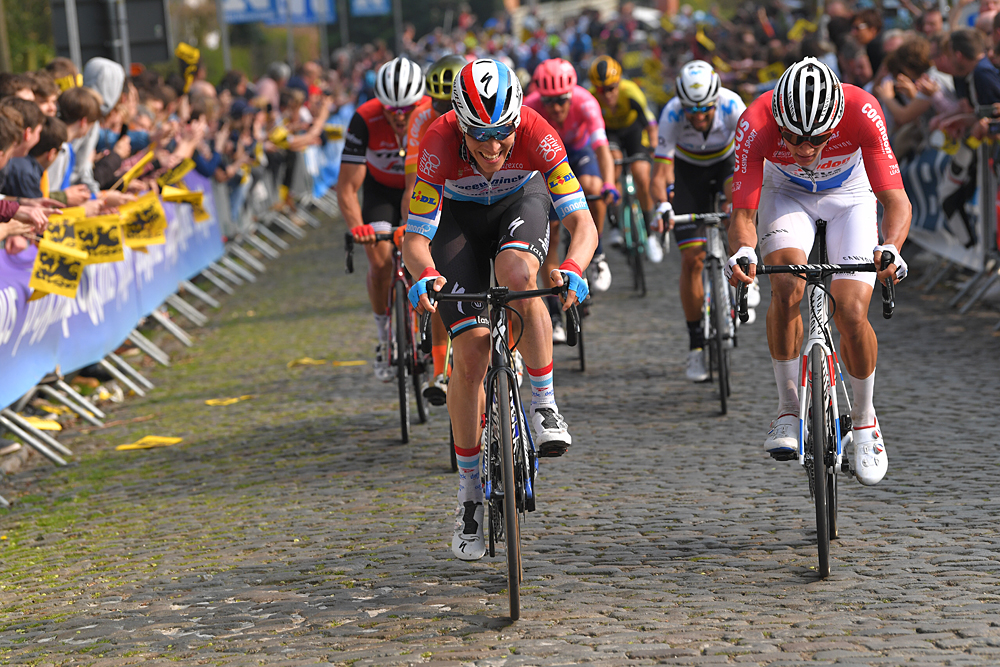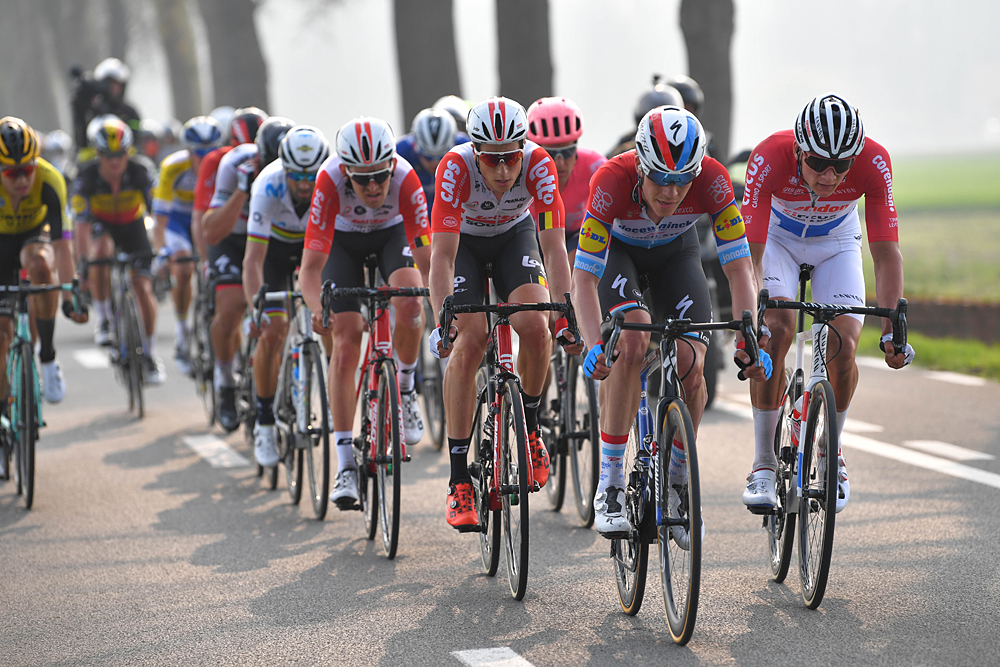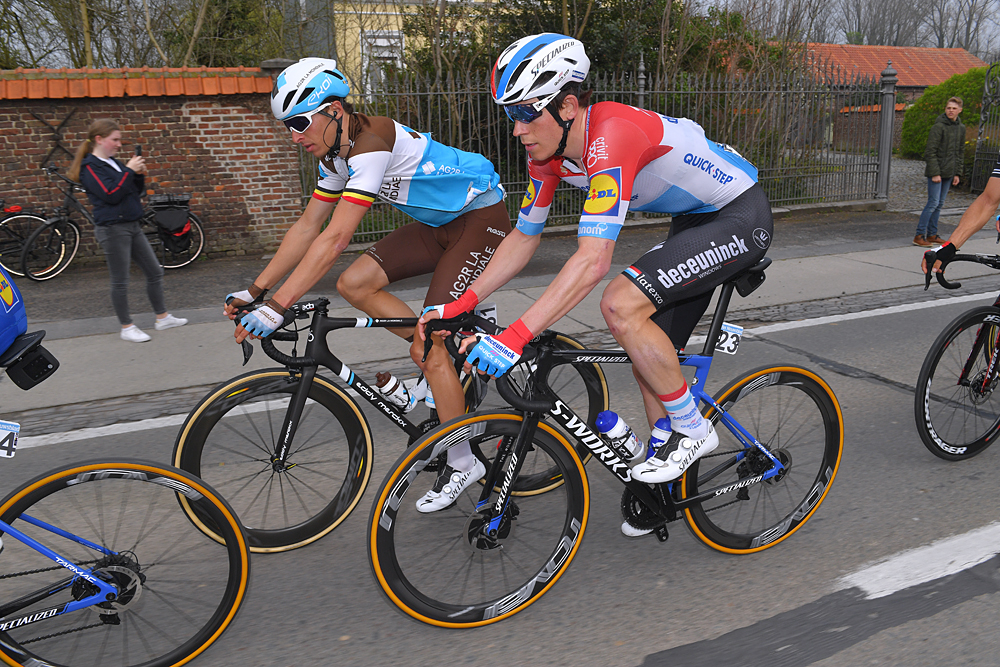Tour of Flanders a race too far for Jungels
Luxembourg champion fatigued as he calls time on Classics campaign



In the end, it was a race too far, and Bob Jungels' sunken eyes told their own story when he emerged from the Deceuninck-QuickStep team bus an hour or so after placing 16th at the Tour of Flanders. "I'm dead," he smiled wanly.
Although a Ronde debutant, the Luxembourg champion had set out from Antwerp among the favourites for victory after an assured maiden cobbled Classics campaign that yielded victory at Kuurne-Brussel-Kuurne. All-action displays at the E3 BinckBank Classic and Dwars door Vlaanderen this past week were enough to convince men like Tom Boonen and Johan Museeuw of his credentials as a possible winner, but Jungels' efforts to this point told in the final hour of racing.
"I'm really very, very happy that it's over," Jungels admitted. "It was a very hard and very long period. I started in Colombia and I've ridden almost every race for victory, each stage for a result. Voilà – today I was on the limit. I felt in the final 50 kilometres that I no longer had the legs I had at E3 or Kuurne. I'm still happy with my spring until now, and now it's time for some rest."
Jungels lined out as part of Deceuninck's quadrumvirate of leaders, but none of the quartet made the expected impact on the finale. Philippe Gilbert was laid low by illness, Zdenek Stybar was jettisoned unceremoniously from the group of favourites on the Hotond, while Belgian champion Yves Lampaert rode a subdued race.
Present and correct for the first major selection on the Muur, Jungels later forced the pace on the Hotond but could not forge clear. He would pay for that effort when Alberto Bettiol (EF Education First) launched his winning attack on the Oude Kwaremont.
"We knew it was going to be a very tactical race but, in the end, it was bizarre. The race really started on the Muur, then it kicked off, but then the peloton came back," Jungels said. "It was a bit chaotic and, in the end, I think everyone neutralised one another a little. For me, it was easier to go clear at Kuurne or E3. I tried once or twice, and on the final time up the Paterberg, I completely exploded."
Jungels recovered sufficiently to find himself in the sizeable group that formed behind Bettiol on the 14km run-in to Oudenaarde, although the unsteadiness of their collaboration rather tempered the ferocity of their pursuit. On the final approach to Oudenaarde, Jungels helped his young teammate Kasper Asgreen – who had already spent time off the front – to clip away and salvage second place for Deceuninck-QuickStep.
Get The Leadout Newsletter
The latest race content, interviews, features, reviews and expert buying guides, direct to your inbox!
"Asgreen was impressive today. He rode so much and then to still do something like that in the final kilometres was impressive," said Jungels, who dismissed the idea that Bettiol had been underestimated by the favourites. "By the time he made the move, nobody underestimated him anymore. Everyone was on the limit, because otherwise we would have followed, so I believe he was probably the strongest today."
Jungels showed his staying power at Monument distance last year when he claimed Liège-Bastogne-Liège after soloing clear on La Roche-aux-Faucons, but the Ronde provides a more tactically complex sort of a challenge.
"It was hard to close the gap to Bettiol. When the team leaders are together like that, there are always two or three who attack and then it comes back. It's the same game every time. That's what makes this race so hard to win," Jungels said.
The Tour of Flanders marked the final act of Jungels' spring. After a period of rest, the Luxemburger's focus shifts to the Giro d'Italia, where he has twice placed in the top 10 overall.
With that goal in mind, he's likely to forgo the defence of his Liège-Bastogne-Liège crown.
"I started very early in the season with good shape in Colombia, and every day, every stage was trying to go for victory. So yeah, it's been a very, let's say, demanding period," Jungels said. "I'm very happy with what I've achieved so far. Of course, today was a gamble. We came up short, but that's sport."

Barry Ryan was Head of Features at Cyclingnews. He has covered professional cycling since 2010, reporting from the Tour de France, Giro d’Italia and events from Argentina to Japan. His writing has appeared in The Independent, Procycling and Cycling Plus. He is the author of The Ascent: Sean Kelly, Stephen Roche and the Rise of Irish Cycling’s Golden Generation, published by Gill Books.